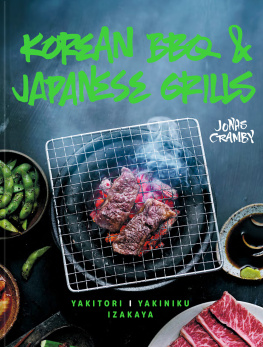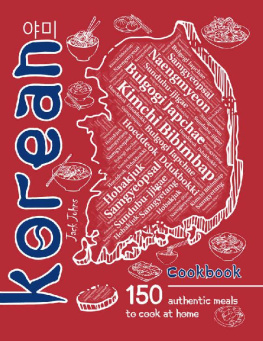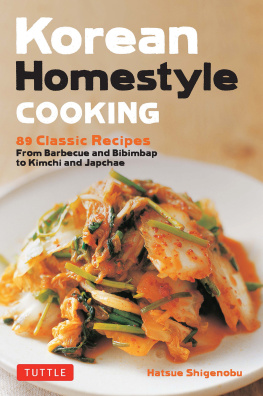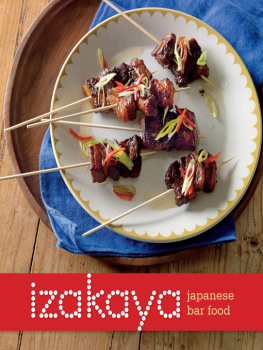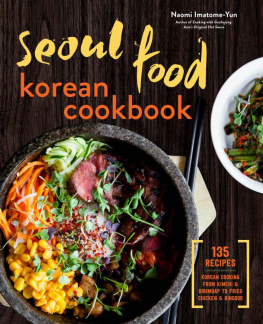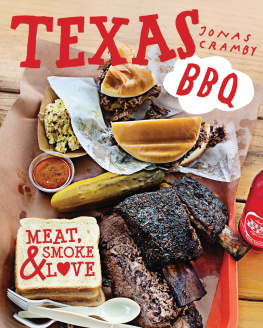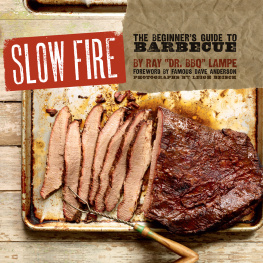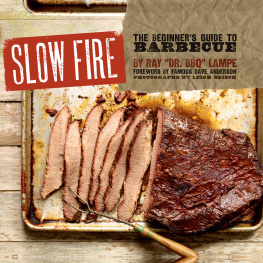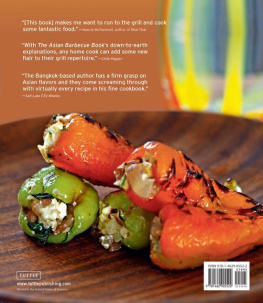Contents
Guide
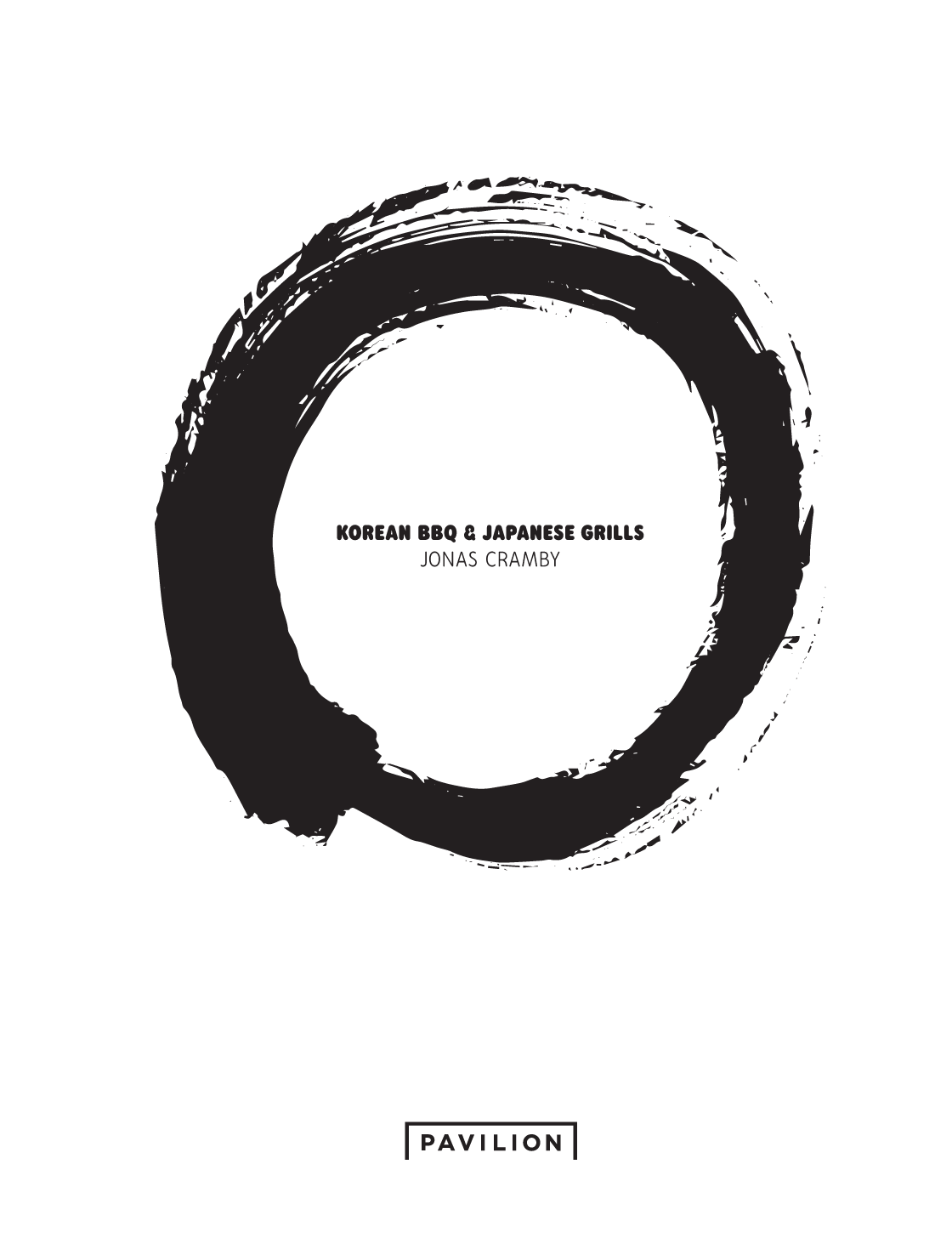
CONTENTS



{FOREWORD ZEN AND THE ART OF GRILLING}
There are many similarities between Korean BBQ and Japanese grilling. Its social cooking, where bite-sized chunks of meat are grilled over small table grills and are enjoyed together with loads of simple, vegetable-based side dishes and even more ice-cold beer. But there are differences. Korean BBQ is simpler, cruder and more authentic. You would drink soju (sometimes poured straight into your beer) instead of sake, as well as a milky rice wine called makgeolli. Koreans make little salad wraps to encase their grilled meats ssam and the sides are neverending; the kimchi is almost more important than the type of meat you use. Japanese grilling, on the other hand, is not just about eating and drinking, its an exercise in mindfulness too. Ingredients, crockery and tools are carefully selected, and something as simple as a piece of chicken, with some salt and fire, can with a bit of practice, the right technique and total engagement in the present transform into something sublime. Japanese grilling is as much about cooking the food as it is about eating it. As the American zen teacher Alan Watts said, you dont dance to aim at a particular spot in the room because thats where you will arrive. The whole point of the dancing is the dance. Well, if it wasnt for the excessive consumption of alcohol and meat, it would be a damn yoga class. To really understand Japanese grilling however, we need a bit of history. And to comprehend the care and effort that is required, we need religion. But lets start with the easy part: history.
From around the Middle Ages until 1872, eating meat was prohibited in Japan. Zen Buddhism is often said to be the reason behind this ban, even though there were probably other, more practical rationale: Japan is an island with an abundance of fish along the coastline, but with a limited supply of arable land, and this land was needed to supply the inhabitants with rice. What is interesting is that Buddha wasnt a vegetarian himself; he refused to introduce bans on meat consumption, and the oldest buddhist scripture, the Pali Canon, retells that he ate slow-cooked pork just before he died. So, Buddhas last meal was pulled pork just wanted to make that clear.
There were occasions when people ate game and a special force within the police, called shinsengumi, was said to have dispensation to eat pork, but, by and large, the Japanese diet comprised rice, vegetables and fish. When the emperor Meiji lifted the ban in 1872, in an attempt to bring Japan in line with the rest of the world, the lack of the knowledge required to prepare this new ingredient meant that it was not uncommon for people to become ill and even die from eating badly-prepared meat.
However, from the Korean neighbourhood of Tsuruhashi in Osaka, seductive smells began to spread...
During the Middle Ages, Korea had had a similar ban on meat to Japan, but when the Mongols invaded the country in the thirteenth century, this was abolished, and it wasnt long before the country developed a highly regarded pork culture. So, when meat became available in Japan, Korean immigrants began to cook their homelands bulgogi, galbi and samgyupsal.
Japans and Koreas mutual history is long, complicated and filled with racism and injustice, but as is often the case people still met over the dinner table. The Korean BBQ that was cooked in Tsuruhashi (see overleaf for a picture from the neighbourhood) slowly spread across Japan. Over time, it changed, becoming more Japanese, and the yakiniku was born.
Another consequence of the meat ban was that, until the twentieth century, Japan was the only country in the world that hadnt made a single native species extinct. When an animal had to be killed, the whole village mourned, and respect was so strong that they held commemorations and built shrines. Still today, Japanese slaughter houses build shrines for lost animals and most people only eat small amounts of high-quality meat.
Zen Buddhism didnt only influence what food to cook, but also how to cook it. In fact, there probably isnt a single aspect of Japanese society that hasnt been influenced by Zen philosophy, and I believe that this is what attracts so many in the West to Japanese culture. Its not the longing for meticulously sewn jeans, filter coffee that takes 30 minutes to pour, or the perfect gemstones that are sashimi, its a longing for another kind of spirituality.
Zen Buddhism is a philosophy that is the direct opposite of Western ways of thinking. Instead of aspiring to unattainable ideals, such as eternal youth, perfection and immortality, buddhists recognise the melancholic beauty in the fact that everything ages, breaks and dies. Rather than throw away a tea cup that has broken, it is mended with golden glue that turns the cracks into beautiful detail.
Since the realization that everything is passing can be painful, its important to always practice existing in the moment, placing no demands on either yourself or the world. This is achieved through meditation. If done correctly, almost anything can be a meditation: going for a walk or drinking a cup of tea. It is regarded as extra important to practice this sort of mindful presence when carrying out the most mundane tasks, not least when preparing food.
Dogen Zenjis Tenzo Kyokun one of the most important texts of Zen Buddhism is aimed at the head chef of a monastery. The books simple but meticulous instructions for rinsing rice and cleaning sesame seeds are also said to be instructions for how to live your life. If you succeed in fully directing your attention and care to something as mundane as cooking, perhaps you can apply this to other aspects of life, too.



FACT FILE
HOW TO EAT
THE FOOD IN
THIS BOOK
The first thing you need to know about Japanese grilling is not how to cook the food, but how to eat it. If you expect that a Japanese grill night is going to be like a traditional Western dinner party, where all the food is served at the same time, everyone gets their own plate that is devoured in fifteen minutes, after which you stand around for a little boogie by the drinks table until its time to go home well, then youre likely to get a bit stressed out. Japanese grilling is not about filling up quickly, but about letting the meal take time. Spending time with each other. Laughing. Drinking. Nibbling. Chatting. Its literally about sharing a meal with others and I find it difficult to think of anything more pleasant in the whole world. There are however a few things to keep in mind:

